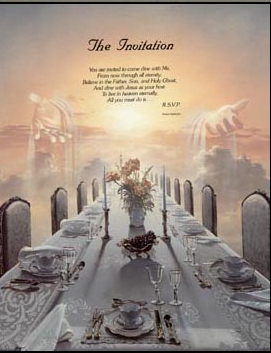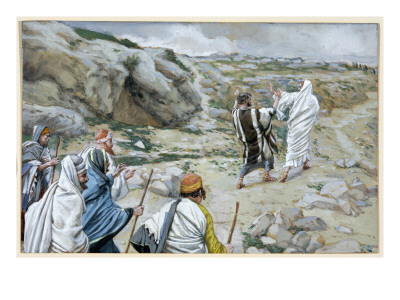Welcome Back to Banquet of the Word!
Join us every week for background on this Sunday readings.
Our mission is simple: We want to help everyone in “pew-land” get more out of mass. Because it’s fun to feel smart about scripture.
As you know, we’re in Advent for 4 weeks. The church looks different during this season:
The church decor (and the border of this blog) is purple for weeks 1, 2 and 4 (purple signifies royalty); rose/pink for week 3 (pink signifies “joy”), and the “hope” of the Messiah to come.
If you have an Advent wreath, today’s the day to light your second purple candle. Consider involving children in this ritual and saying a short prayer as a family!
Fun Fact about St Mark:
We are now in year B – it’s all about Mark! Mark is dubbed “The Hollywood Gospel.” He moves fast and catches the highlights of Jesus’s ministry, his life, death and resurrection. He says “Immediately” a total of 41 times in his writing – that’s a lot!
Isaiah 40: 1-5; 9-11
(The 1st Reading is Old Testament. It always links to the Gospel.)
Oh what a beautiful reading this week! It’s one of Isaiah’s most “famous” – it begins, “Comfort, give comfort to my people.” I just love that line. Sit back and listen to the lector read this and just enjoy it’s beauty. You will hear:
- Themes of comfort. God wants to bring comfort to his afflicted people. He does this by bringing us Jesus.
- We hear what Christ will DO. He will make our winding roads straight again. He will fill in the valleys. The imagery here is beautiful. Just know that it is an analogy for our sins; with Adam, our covenant was broken. We once had a STRAIGHT PATH to God. When sin crept in, we make that road windy, unclear, full of stumbling blocks. The point here is that Jesus STRAIGHTENS that path. We must welcome Him this Christmas into our hearts and homes and families!
- We hear about a voice. One crying out from the desert. One shouting from the mountain tops. Whose voice is that? It is ours. It is also the people of Israel. We cry out for God’s guiding hand. Listen further for the power that God’s presence and word brings.
How do you need to hear the words “Comfort, give comfort to my child (insert your name here).” How can God give you comfort this season?
Psalm 85: Lord Let us See Your Kindness and Grant us Your Salvation:
(The Psalm is a “response” to what we heard in the 1st Reading)
See themes of “the voice” from reading 1 and what we hear. See themes of what we are to prepare (“the Way”):
I will hear what God proclaims;
the LORD—for he proclaims peace to his people.
Near indeed is his salvation to those who fear him,
glory dwelling in our land.
The LORD himself will give his benefits;
our land shall yield its increase.
Justice shall walk before him,
and prepare the way of his steps.
2 Peter 3: 8-14
(The 2nd reading is usually from Paul’s letters. Today we hear from Peter. He too speaks to how the early church was built after Christ’s death and resurrection).
This is St. Peter’s 2nd letter, in which he writes just beautifully about what we are to expect when it comes to Christ’s promise and how we are to live until he comes again. Another reference here to a theme for today: PEACE.
I love the first line about 1 day being like 1000 years, and 1000 years like 1 day. Now that’s something to contemplate this week during your prayer time. Which of your bad days has felt like 1000 years? The death of a loved one, a spouse or child, a divorce etc. How has 1000 years felt like 1 day?
To me I can only think of our world and how it will remain broken until Christ comes again, no matter who is in power, no matter what political structure is in place. We act today like the unfaithful Israelites of 1000+ years ago.
Let us listen to the hope St. Peter gives:
Do not ignore this one fact, beloved,
that with the Lord one day is like a thousand years
and a thousand years like one day.
The Lord does not delay his promise, as some regard “delay,”
but he is patient with you,
not wishing that any should perish
but that all should come to repentance.
But the day of the Lord will come like a thief,
and then the heavens will pass away with a mighty roar
and the elements will be dissolved by fire,
and the earth and everything done on it will be found out.
Since everything is to be dissolved in this way,
what sort of persons ought you to be,
conducting yourselves in holiness and devotion,
waiting for and hastening the coming of the day of God…
Mark 1:1-8
(The Gospel is the highest point of the Liturgy of the Word. That’s why we stand.
We are about to hear from and be instructed by Christ Himself.)
We are in the very first 8 verses of Mark’s gospel today, as the first verse notes:
The beginning of the gospel of Jesus Christ the Son of God.
It’s a really perfect reading for Advent. Why? It’s where our hearts should be. It references Isaiah (from R1) and it echoes those verses “Prepare the way, crying out in the desert). John the Baptist talks about how he is not worthy to baptize as Christ will; he isn’t even worthy to untie his shoes!
It’s just a time to stop and say, wow. We are preparing for something truly amazing this Advent: The coming of our savior.
How is your Advent preparation going? Don’t expect too much of yourself and set yourself up for disappointment. For example, if you need to carve out more prayer time and that’s a goal of yours this Advent, start small.
Each morning I try to pray 1 Our Father, 1 Hail Mary and 1 Glory Be before my feet hit the floor. Sometimes I do, sometimes I don’t. But on the mornings I do it, I feel happy I’ve “said Hello” to God and thanked Him for the breath in my lungs that day (before I turn my phone on to check messages…). It’s small, but it matters, and it brings me a sliver of peace for the day.
We still have 2 weeks before Christmas. Commit to one small action this week and THEN, ask God to help you reach it! As we heard on the Feast of the Immaculate Conception this week? “For Nothing is Impossible For God.” 🙂 Today’s gospel reading is below. God bless your week!
As it is written in Isaiah the prophet:
Behold, I am sending my messenger ahead of you;
he will prepare your way.
A voice of one crying out in the desert:
“Prepare the way of the Lord,
make straight his paths.”
John the Baptist appeared in the desert
proclaiming a baptism of repentance for the forgiveness of sins.
People of the whole Judean countryside
and all the inhabitants of Jerusalem
were going out to him
and were being baptized by him in the Jordan River
as they acknowledged their sins.
John was clothed in camel’s hair,
with a leather belt around his waist.
He fed on locusts and wild honey.
And this is what he proclaimed:
“One mightier than I is coming after me.
I am not worthy to stoop and loosen the thongs of his sandals.
I have baptized you with water;
he will baptize you with the Holy Spirit.”








 He turned and said to Peter, “Get Behind Me, Satan.”
He turned and said to Peter, “Get Behind Me, Satan.”